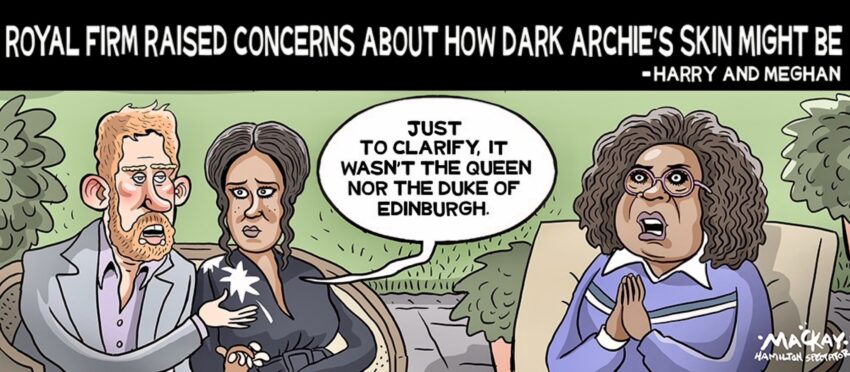In the ever-evolving landscape of royal narratives, few stories have captured public attention quite like that of Prince Harry and Meghan Markle.
Today, we dive into the controversial treatment they have received from the British media and the alleged complicity of the Royal Family in this ongoing saga.
The scrutiny faced by this couple has sparked debates about bias, fairness, and the broader implications of media influence.
The British press has been relentless in its coverage of Harry and Meghan, often painting a bleak picture that strays far from reality.
From sensational headlines to scathing opinion pieces, the couple has been subjected to an onslaught of negativity that feels disproportionate.
This isn’t just a tabloid issue; even respected newspapers have joined the fray, contributing to a narrative that many deem unfair.
Meghan Markle, in particular, has faced an avalanche of criticism since her relationship with Harry became public.
Every decision she makes, every aspect of her life, has been scrutinized to an extent that can only be described as harsh.
The same scrutiny extends to Harry, whose choice to step back from royal duties has been framed as a betrayal rather than a necessary step for his family’s mental health.
What’s more troubling is the apparent imbalance in media reporting.
While Harry and Meghan are under constant fire, other members of the royal family seem to enjoy a protective shield from similar scrutiny.
This discrepancy raises questions about double standards and bias within the media landscape, further eroding trust in journalistic integrity.
The consequences of this relentless coverage are stark.
The couple’s public image has suffered immensely, but perhaps more alarmingly, their mental health has been impacted by the ceaseless barrage of negativity.
Such a reality paints a grim picture of how the press can wield its power, influencing not just public perception but also personal well-being.
As we dissect this situation, it becomes evident that the narrative surrounding Harry and Meghan has been blown out of proportion.
The portrayal of a rebellious prince and his ambitious wife has created a toxic environment, prompting calls for more balanced reporting.
The media should be a force for truth, not a tool for crafting damaging narratives.
However, the British press isn’t the only player in this drama.
Allegations have surfaced suggesting that the Windsors, particularly Prince William and King Charles, may have had a hand in shaping this negative portrayal.
It’s a bitter reality to confront, but it appears that the royal family could have intervened to foster unity, yet chose instead to allow the media to continue its onslaught.
Prince William, often seen as the responsible royal, is frequently contrasted with Harry’s portrayal.
Is this merely coincidence?
Or is there a strategic effort to elevate William’s image while casting Harry in a less favorable light?
The timing of the media’s intensified scrutiny around the time of Charles’s plans to streamline the monarchy raises further questions about intent.
The Windsors are no strangers to media manipulation.
Historically, they have cultivated relationships with journalists, sometimes to their advantage.
Could it be that they are using the media to serve their interests in this instance as well?
While we may never grasp the full extent of their involvement, it’s clear that the dynamics within the royal family have played a role in Harry and Meghan’s departure from royal duties.
Despite stepping away from royal responsibilities, Harry and Meghan remain in the media’s crosshairs.
Their desire for privacy seems to be met with relentless intrusion, as every detail of their lives continues to be scrutinized.
The couple’s attempts to carve out a new path are often met with derision, illustrating the media’s refusal to acknowledge their autonomy.
This fixation on Harry and Meghan transcends mere curiosity; it resembles a campaign designed to undermine them.
The media’s relentless pursuit feels less like journalism and more like a spectacle of intrusion.
The couple has expressed their wish to lead quieter lives, focusing on family and work, yet the media persists in dragging them back into the spotlight.
As we reflect on this ongoing saga, a pressing question arises: when will the media finally grant Harry and Meghan the peace they deserve?
The troubling reality is that the media seems unwilling to respect their choices, opting instead for a continuous cycle of criticism and speculation.
Former MP Norman Baker’s recent revelations shed light on the media’s bias.
He recounted how he was directed to criticize Harry and Meghan while being instructed to spare William and Kate from similar scrutiny.
This admission underscores the manipulative nature of media narratives and raises serious concerns about the integrity of the information we consume.
Baker’s insights suggest a calculated effort to vilify Harry and Meghan while safeguarding the reputations of others.
This isn’t journalism; it’s a smear campaign.
The implications of such manipulation are profound, calling into question the very essence of media responsibility and its role in shaping public opinion.
In examining the treatment of Harry and Meghan, it becomes clear that they have been subjected to an unrelenting and unfair media assault.
The bias displayed by the press, coupled with the alleged complicity of the royal family, reveals a troubling narrative that warrants scrutiny.
As we navigate this complex landscape, one thing remains certain: the quest for truth and fairness in reporting is more important now than ever.
